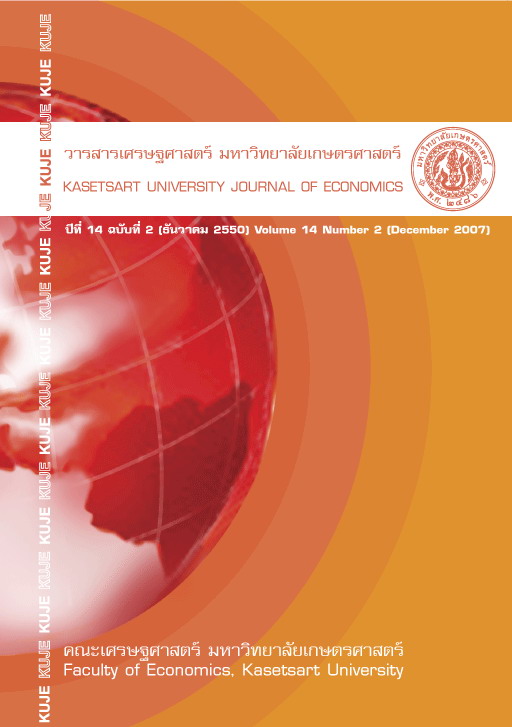Market-based Instrument for Waste Water Management in Thailand
Main Article Content
Abstract
บทคัดย่อ
การศึกษานี้ทดสอบความมีประสิทธิภาพของเครื่องมือทางด้านตลาดเพื่อการจัดการปัญหามลพิษทางน้ำในประเทศไทย โดยพิจารณา 3 ชุดเครื่องมือ ได้แก่ 1) การใช้ใบอนุญาตปล่อยน้ำเสียที่สามารถจำหน่ายเปลี่ยนมือได้ ณ ระดับราคา 4.98 บาท/ใบอนุญาต 2) การจัดเก็บค่าบริการบำบัดน้ำเสียในอัตรา 0.83 บาท/ลบ.ม. และ 3) การใช้นโยบายที่ 1 และ 2 ไปพร้อมกัน การวิเคราะห์ใช้แบบจำลองดุลยภาพทั่วไป (CGE) ในการหาผลกระทบทางเศรษฐกิจ ผลการวิเคราะห์จากแบบจำลองระบบเศรษฐกิจพบว่า เครื่องมือทางด้านตลาดสามารถใช้จัดการน้ำเสียได้อย่างมีประสิทธิภาพ โดยที่การใช้นโยบายแรกทำให้ปริมาณน้ำเสียของภาคอุตสาหกรรมไม่เพิ่มขึ้นจากปริมาณเริ่มต้น นโยบายที่สองทำให้ปริมาณน้ำเสียของชุมชนลดลง 28.29 ล้านกิโลกรัมบีโอดี/ปี และเกิดผลกระทบในทำนองเดียวกันเมื่อใช้นโยบายทั้งสองร่วมกัน แต่ปริมาณน้ำเสียของชุมชนลดลงมากขึ้นเป็น 29.84 ล้านกิโลกรัมบีโอดี/ปี การใช้นโยบายเหล่านี้ก่อให้เกิดรายได้แก่รัฐซึ่งสามารถนำไปใช้จัดการปัญหาน้ำเสียได้
คำสำคัญ : การจัดการน้ำเสีย, เครื่องมือทางการตลาด, แบบจำลองดุลยภาพทั่วไป, บัญชีเมตริกทางสังคม
Abstract
This study tested the efficiency of some market-based instruments (MBI) in coping withwaste water pollution in Thailand. It comprises three policies: 1) tradable water permit at 4.98Baht/permit, 2) emission charge for households at 0.83 Baht/m , and 3) "1" and "2" appliedtogether. The analysis used the computable general equilibrium (CGE) model to investigate theeconomy-wide impacts of the policies. The simulation results indicated that MBI is an efficientmanagement tool for waste water management. The first policy would maintain the volume ofwaste water from industry sector at the initial level. The second would decrease household wastewater by 28.29 million kg - equivalent BOD/year. The same results were obtained when the twopolicies used together, but household waste water decreased further to 29.84 million kg -equivalent BOD/year. The policies would enable the government to raise revenue, which can beused for waste water management.
Keywords : waste water management, market-based instrument (MBI), computable generalequilibrium (CGE), social accounting matrices (SAM)Article Details
The paper is published under CC BY-NC-ND, in which the article is freely downloaded and shared in its original form non-commercially and its citation details are identified.


